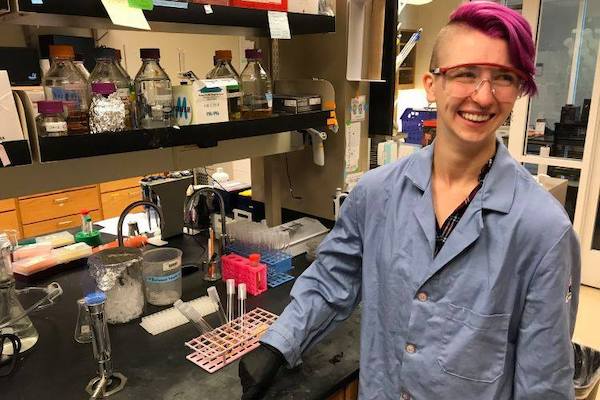

The “chemistry core” is an active learning curriculum that teaches everything you need to launch a chemistry major on either the B.A. or B.S. track. These courses are also designed to cover the material required for pre-health careers and the MCAT.
Once you've completed your core courses, you can choose from a range of upper-level lecture and laboratory electives to explore your interests and academic goals. Examples of electives include Biochemistry, Quantum Mechanics, and Organometallic Chemistry.

Emory offers an ACS certified degree to students on the B.S. track who take specific elective credit. See a chemistry advisor to make a plan for the ACS track.

B.S. majors engaged in research may substitute 3 units of CHEM 495/499 in place of one advanced-level lab course.

Chemistry is great preparation for both majors and non-majors. Non-majors interested in pre-health careers should complete the chemistry core through CHEM 204/204L

Students with AP/IB credit may elect to swap CHEM202z/203z for CHEM 202/203. This accelerated track is the preferred pathway for students entering with a strong chemistry background.

Students pursuing a B.S. degree will take a capstone course in their final semester. Although seats are limited, B.A. majors can request to take a capstone course to fulfill their upper level elective requirement.

Students may complete a biomolecular specialization as part of the BA or BS major. Read more about this option in the advising guide.

Chemistry offers a study abroad experience in Siena, Italy each summer that includes an opportunity to earn credit towards the chemistry major. See the Study Abroad website for details.

Students who intend to earn an Honors degree in chemistry must complete one graduate-level chemistry course. Email both the instructor of the course and the undergraduate program coordinator, to request a permission number.

Students who excel in introductory chemistry courses have the opportunity to become peer learning assistants. Working alongside faculty reinforces concepts and prepares students to mentor in future careers.
Typically grade disputes or re-grade requests are only appropriate and effective when students can demonstrate that an inappropriate grade was assigned as a result of conditions such as mechanical grading error, a math error (e.g., adding total points on an exam), assignment of a grade inconsistent with those assigned other students, or grading inconsistent with a predefined grading rubric.
First and foremost a student should meet with the faculty member who taught the course and should attempt to work out the dispute at that level. If and only if no satisfactory resolution can be achieved between the student and faculty should the following procedure be followed: The student then meets with the Director of Undergraduate Studies (DUS) who will try to resolve the situation between the student and faculty. In cases where the re-grade request concerns a course that the DUS is directly involved in teaching, the student should meet with the Department Chairperson.
If there is indication that the student does not feel the case has been resolved they will be asked to write a brief (1 page) summary of their grievance to be reviewed by the Undergraduate Committee in Chemistry (UCC). The UCC (with any involved faculty recused) will communicate with the faculty member and discuss the issue with them in hopes that the situation can be resolved at this point within the department, and will make the final decision.
Approved by Undergraduate Committee, 9.16.20. The Office of Undergraduate Education (OUE) requires academic departments serving undergraduates to provide online access to their grade dispute policy.